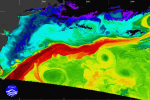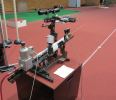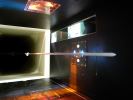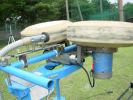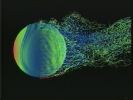Research
We're studying mechanics of various fluid phenomena in a large variety of scales. They include the vortex motions observed in the atomosphere and ocean, aerodynamics of flying missiles and microfluics. We also study not only the conventional flows (liquid or gas) but also granular flows, in which individual nature of each particle plays an important role in determining the macroscopic property of the flow.
Environmental fluid mechanics
- We're investigating, under the quasi-geostrophic approximation, the processes of vortex formation and breakdown having various temporal and spatial scales by means of a direct numerical simulation for a point vortex system.
Fluid mechanics in sports
- We're investigating the aerodynamic property of flying arrows through a MSBS Wind Tunnel experiment and a direct measurement of the trajectory.
- We're studying the aerodynamic property of spinning missiles, such as a ball and discus.
Aeronautics and astronautics
- The pressure sensitive paint (PSP) is a fluorescent paint that changes its emission intensity depending on the ambient pressure. We're developping a new technique for pressure measurements using PSP in collaboration with JAXA.
- We're studying the behavior of non-equilibrium gas flows, such as rarefied gas flows or super/hypersonic flows
Microfluidics
- We're developping a technique for mixing liquides in micro-scale tiny drops by using vibrations with very small amplitudes.
- We're studying the behavior of gas flows in small-scale systems on the basis of kinetic theory.
Granular flows
- The research subject of the Matuttis group is the statistical physics of ambivalent states of matter away from conventional "flow" and in the presence of strong disorder. For the field of (dense) granular materials, the effect of the particle shape, packing and configuration history on the macroscopic properties are investigated both with experimental and particle based computational methods. Currently, a Newtonian is being integrated into the granular simulation fluid via the finite element method. Further research interests are the simulation of strongly correlated electrons via quantum Monte-Carlo simulation (where the disorder exists in the configurations along the Suzuki-Trotter-direction and jellium-like electron flow is prevented by many-particle effects) and the possibilities of the dynamical scaling/Non-Equilibrium Relaxation method.

